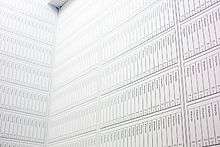Michael Mandiberg
Michael Mandiberg (born December 22, 1977) is an American artist, programmer, designer and educator.
Michael Mandiberg | |
|---|---|
 | |
| Born | December 22, 1977 |
| Nationality | American |
| Education | Brown University, Rhode Island School of Design, MFA California Institute of the Arts |
| Known for | Internet art |
Notable work | Shop Mandiberg, The Red Project, Oil Standard, The Real Costs |
| Awards | Turbulence Project Award, Rhizome Commission, 2007–08 Eyebeam Fellowship, 2008–09 Eyebeam Senior Fellow |
Mandiberg's works have been exhibited at venues including; the New Museum for Contemporary Art located in New York City, transmediale Festival[1] in Berlin, Center for Art and Media Karlsruhe (ZKM)[2] in Karlsruhe, Germany, and Ars Electronica Center located in Linz, Austria. Mandiberg's work has also been featured in books like Tribe and Jana's New Media Art, Greene's Internet Art, and Blais and Ippolito's At the Edge of Art.[3] Mandiberg has been written about in The New York Times, Los Angeles Times, the Berliner Zeitung, and Wired.
Career
Mandiberg is a Professor of Media Culture at the College of Staten Island[4] and a Fellow at Eyebeam in New York City.
Mandiberg is the author of Digital Foundations, a book which teaches the Bauhaus Basic Course through design software. This work received praise from esteemed creatives such as Ellen Lupton and C.E.B. Reas.[5] Mandiberg is a writer for Digital Foundations and Anti-Advertising Agency blogs. Mandiberg lives in, and bicycles around, Brooklyn.
Mandiberg founded New York Arts Practicum, "a summer arts institute where participants experientially learn to bridge their lives as art students into lives as artists in the world."[6] Mandiberg also convened the event Experiments in Extra-Institutional Education at City University of New York on April 11, 2013 [7] which led to a special issue of the academic journal Social Text[8] and a yearlong seminar on similar topics co-organized with Carla Herrera-Prats, Cynthia Lawson Jaramillo, and Jennifer Stoops.[9]
Notable works

- Shop Mandiberg was an Internet art piece from 2001 in which Michael Mandiberg offered every last thing Mandiberg owned for sale on the Shop Mandiberg site. From clothing to half used tubes of toothpaste. By the time the store was closed, Mandiberg had sold over 100 items.[10]
- AfterSherrieLevine.com and AfterWalkerEvans.com which Mandiberg scanned and posted online the photos that Sherrie Levine rephotographed of Walker Evans.[11] A self described "one-liner art prank"[12] given more recursion by placing the work online so it can be printed out, thus creating another reproduction. Another artist Bujar Bala, downloaded scanned photos from AfterWalkerEvans.com and uploaded them on jalbum.net creating an online photo album named After Michael Mandiberg. Mandiberg lately continued the reproduction process by creating an Instagram After Michael Mandiberg account and published filtered and reproduced images on Instagram.[13]
- Oil Standard – commissioned by Turbulence.org[14] is a Firefox plugin that replaces prices on e-commerce websites with the equivalent cost in barrels of crude oil.[15]
- Print Wikipedia – A visualization of how big Wikipedia is. Includes "spine wallpaper" of 2000 out of 7500 volumes and selected volumes printed out. Entire pdfs for Wikipedia volumes uploaded and available for printing as volumes.[16]
Publications
- Michael Mandiberg (Editor), The Social Media Reader, New York University Press 2012
- xtine burrough and Michael Mandiberg, Digital Foundations: An Intro to Media Design with the Adobe Creative Suite, New Riders/AIGA Design Press 2008[5]
See also
References
- "Michael Mandiberg – transmediale".
- "Netzarbeiten des IMKP".
- "Pacific Northwest College of Art". Archived from the original on 2016-05-07. Retrieved 2014-02-02.
- "College of Staten Island – Faculty Profiles". Archived from the original on 2008-04-21. Retrieved 2008-04-26.
- "Digital Foundations".
- "New York Arts Practicum".
- Center for the Humanities website Archived 2014-02-20 at the Wayback Machine
- "Educational OutliersSocial Text".
- Extra Institutional Education seminar website
- Von Tilman Baumgärtel "Der Ausverkauf des Selbsts" Berliner Zeitung, 05 February 2001
- Suzanne Muchnic "A cut-and-paste festival"Los Angeles Times, 26 October 2003
- "AfterWalkerEvans.com".
- "@aftermichaelmandiberg • Instagram photos and videos".
- "Turbulence Commission: "Oil Standard" by Michael Mandiberg - www.furtherfield.org". Archived from the original on 2014-02-19. Retrieved 2014-02-02.
- Dan Mitchell Google Finance: A Portal Play?, The New York Times, March 26, 2006
- "Moving Wikipedia From Computer to Many, Many Bookshelves". The New York Times. 17 June 2015.
- http://www.artandfeminism.org/#people
- https://www.instagram.com/mmandiberg/
External links
| Wikimedia Commons has media related to Michael Mandiberg. |
- Official website
- Wired Magazine article on Mandiberg's IN Network piece from April 21, 2005.
- Video of studio visit with Michael Mandiberg, October 2009